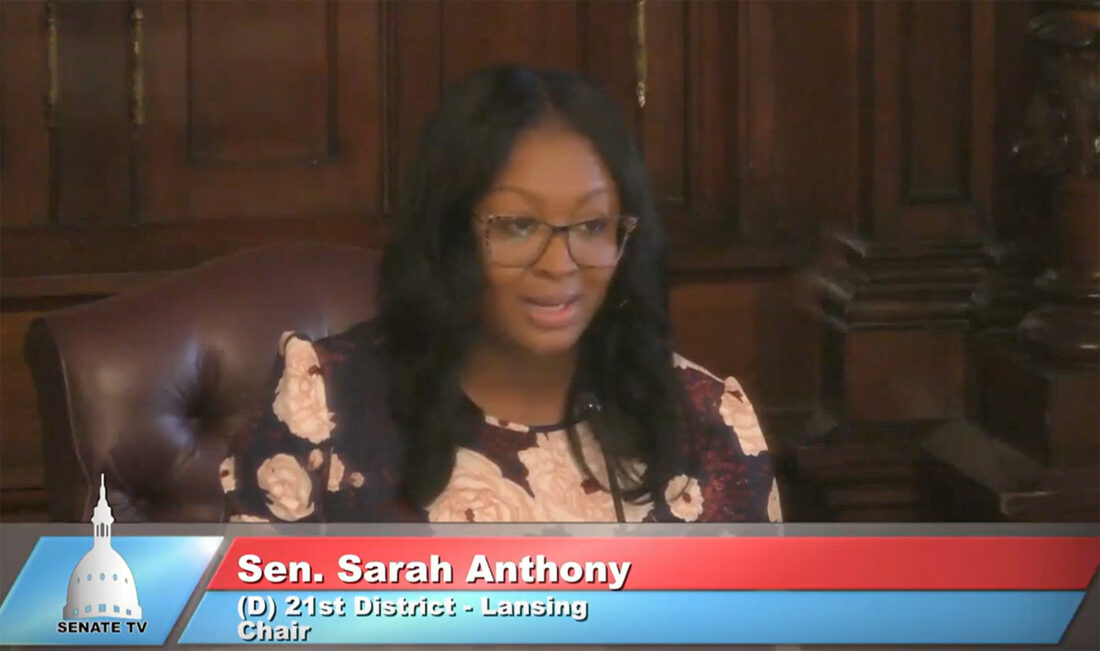Michigan Senate appropriators have first hearing on new earmark rules

Michigan Senate Appropriations Chair Sarah Anthony, D-Lansing, leads discussion Wednesday on a proposal to institute earmark transparency rules. (Susan J. Demas, screenshot photo)
In a move that shows the government budget cycle is never truly over, appropriators in the Michigan Senate on Wednesday took their first steps toward instituting the House’s earmark transparency rules into state law.
Members of the Senate Appropriations Committee had a hearing for Senate Bill 596, which would amend Michigan’s Management and Budget Act to set conditions under which earmarks are considered before they are placed in a final budget proposal in either chamber of the Legislature.
The conditions under SB 596 would include the name of the lawmaker introducing the earmark, the total amount requested, the name of the intended recipient and the purpose of the earmark. The request must also include an attestation that no conflict of interest existed between the legislator or the state and the recipient, and that the recipient is not a for-profit entity.
All earmarks in the new regime, if passed, must also not be distributed to a state agency or department, and is only a one-time appropriation in any future budget bill. Any program or request put forward in the governor’s budget recommendations would not qualify for a legislatively directed spending request.
State Sen. Sarah Anthony, D-Lansing, chair of the Senate Appropriations Committee and sponsor of the bill, said the new rules continue Michigan lawmakers’ commitment to open government and responsible budgeting.
“Since taking office in 2023 we have taken some pretty important steps to ensure legislators had to put their name next to each and every earmark that they championed on behalf of their communities, establishing a clear, transparent process for the first time,” Anthony said. “This bill builds upon that good work, ensuring that those commitments are made in the light of day, and building an additional time for public review.”
Creating a process to identify which lawmakers introduced what earmarks, and how much they might cost taxpayers, was a key House Republican priority in the 2025-26 budget fight that just wrapped this week with Gov. Gretchen Whitmer’s signing of the spending bills. The House instituted rules this year under Republican control for earmark reform in its chamber, and also built a website to catalogue all earmark requests. The requests were scrutinized before they made the House’s final spending proposal.
Republicans in the lower chamber were adamant that their Senate colleagues do the same before any deal could be negotiated or finalized. The Senate eventually caved, but the disclosure of the Senate’s earmarks did not occur until Thursday, Oct. 2, one day after lawmakers passed a continuation budget because they could not finalize a deal before the beginning of the new fiscal year.
The Senate Appropriations Committee had a meeting that evening where it finally detailed all of its earmarks and what would appear in the budget – a win for Republicans who were pushing for the reforms.
On Wednesday, Anthony opened up the bill to discussion to see what improvements could be made on the Senate’s version, which aimed to slate those rules into state law.
State Sen. Rosemary Bayer, D-West Bloomfield, said given the fight the Legislature just went through, one issue she saw in the process occurring on the House side dealt with the public identification of lawmakers’ requests.
“There were times where legislators were harassed because they didn’t put things on the list, or because they did,” Bayer said. “They had a hard time from folks. Sometimes you need a little protection as you talk to people, when they request things. We get way more requests than we’re ever going to be able to fulfill.”
Bayer added that maybe not publishing everything, except for items that will definitely be in the final budget, was a good idea.
Anthony said that was certainly something to consider.
“I know that in my Senate district, we get lots of local requests. We have a mix of urban, rural, suburban requests,” Anthony said. “And because of the limited state funds that we have, there’s a lot of folks who are disappointed, and oftentimes, they want to see me as their senator fighting for everything. So, I do think it’s a balance, but it’s something that we can contemplate throughout this process.”
State Sen. Mallory McMorrow, D-Royal Oak, said that some early version of the proposed process played out on the final day of the chambers’ budget action, and wanted to know what lawmakers could expect.
Anthony said their colleagues in the House, which jumpstarted the process, and the executive office are all interested in finding out how they can share a more transparent earmarks process with additional rules and conditions, and that the Senate’s version might even include more disclosures in a final version.
“The House may have its own spin, so ideally, we would have a shared set of disclosure that we would all make sure are contemplated and then how we do it, the flavor that the Senate does it versus the House, I think ultimately it’s up to this body,” Anthony said. “But I think the goal stays the same … making sure that the public, the press, anyone who is interested in knowing where their dollars are going, that we’re doing that earlier, and there’s a structured process, and it is accessible to the public.”
The committee did not move the bill forward and will likely be subject to further discussion at a future meeting.




